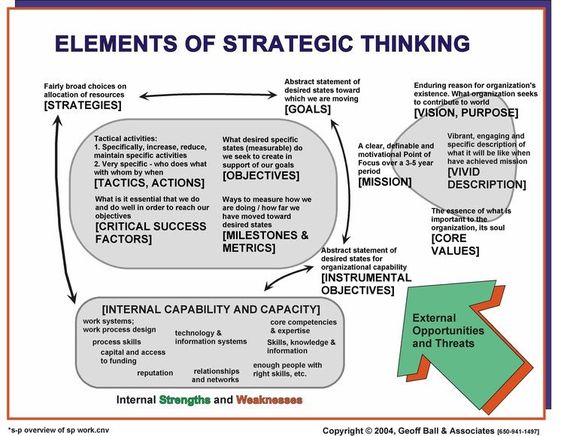Strategic thinking is a crucial ability to have in today’s ever-changing business environment. If you want to become a better strategic thinker, you will need to develop a few essential skills to help you analyze the situation correctly, formulate meaningful plans, and execute them with precision. Here are a few practical steps that you can take to develop your strategic thinking abilities.
Understand Your Purpose
The first thing you need to do if you want to become a better strategic thinker is to understand your purpose. You need to take the time to reflect on what you are doing and why you are doing it. Having a clear purpose can help you stay focused, avoid distractions, and make better decisions.
Analyze Your Environment
To become a strategic thinker, you need to analyze your environment correctly. You need to understand the market, your competition, and your customers. Gathering data, researching trends, and analyzing the data can help you make better-informed decisions.
Think Ahead
Strategic thinking means thinking ahead. You need to be able to anticipate future trends, opportunities, and challenges. You should be able to forecast the impact of your decisions and develop contingency plans for unexpected situations.
Identify Your Strengths and Weaknesses
As part of your strategic thinking, you should take the time to assess your strengths and weaknesses honestly. Knowing your capabilities can help you play to your strengths and mitigate your weaknesses. Additionally, you can identify areas where you need further development.
Create a Plan
Once you have gathered enough information, analyzed the situation, and reflected on your purpose, it’s time to start developing a plan. A strategic plan should outline your objectives, strategies, tactics, and metrics. It should also consider potential risks and challenges and have contingency plans to address them.
Communicate Your Plan
Communication is a vital aspect of strategic planning. You should communicate your plan to your team, stakeholders, and other relevant parties. It’s essential to ensure that everyone involved understands the goal, the strategy, and their role in the execution of the plan.
Monitor and Adjust
Once you’ve developed and communicated your plan, you need to monitor its progress and make adjustments when necessary. Your plan should have clear metrics to help you track performance and inform decision-making. Regular reviews can help you identify potential issues and adjust your plan accordingly.
You might find these FREE courses useful
- Strategic Technology Management Specialization
- Strategic Management
- Strategic Sales Management Specialization
- Strategic Management Certificate | IIM Kozhikode | Coursera
Practice and Refine
Lastly, strategic thinking requires practice and continuous refinement. You need to adapt to the dynamic business environment and continually improve your skills. You can learn from your successes and failures, seek feedback from other professionals, and attend training and development programs.
In conclusion, developing strategic thinking skills takes time, effort, and practice. Understanding your purpose, analyzing your environment, thinking ahead, identifying your strengths and weaknesses, creating a plan, communicating your plan, monitoring and adjusting, and practicing and refining skills are essential steps to help you become a better strategic thinker. By following these steps, you can develop a strategic mindset that can help you make better-informed decisions and achieve better results.
